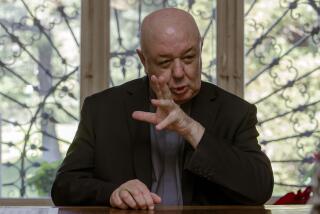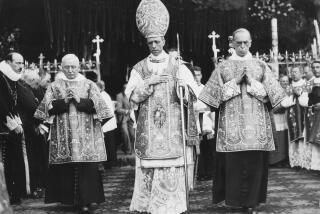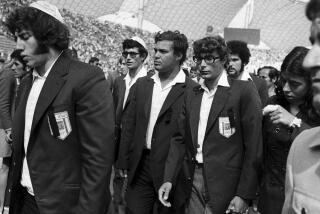Study of Vatican in Nazi Era Halted
- Share via
A commission of Roman Catholic and Jewish historians has suspended its study of Vatican actions during the Nazi era after the church declined to open additional archives for investigation.
The decision set off a stir within Catholic and Jewish circles. A Jewish member of the 2-year-old panel said he would be “hugely surprised” if the commission didn’t disband altogether.
One of the key reasons for the creation of the commission was to research decisions by Pope Pius XII during World War II in the face of the Nazi Holocaust. Critics have accused the pontiff of remaining silent in order to protect the church’s interests. Backers, however, said that Pius worked behind the scenes to save Jews.
The commission members--appointed by the Vatican and a Jewish group--have been working with 11 volumes of previously published church documents provided by the Vatican. Those papers, at times richly footnoted with references to other documents not in the hands of historians, prompted the commission to ask for access to additional papers.
But last month the Vatican told the commission to wrap up its study based only on its review of the original 11 volumes. Boxes of documents after 1923 simply haven’t been cataloged and bound for release, said Eugene Fisher, a panel coordinator and top ecumenical official at the National Conference of Catholic Bishops in Washington.
Historians trace the beginning of the Holocaust to Nov. 9, 1938, with Kristallnacht, the destruction and looting of Jewish homes, stores and synagogues. But persecution of the Jews began as early as 1933 when Adolf Hitler came to power. Pius XII was Vatican ambassador to Germany from 1920 to 1929 and reigned as pope from March 12, 1939, until his death Oct. 9, 1958.
Instead of archival access, the Vatican suggested the commission pose its questions to Father Peter Gumpel, who is in charge of promoting the cause for the beatification of Pope Pius XII.
In view of the Vatican’s stance, the five commission members said in a July 20 letter that they were suspending their studies because “we could not maintain our credibility with the many voices, Catholic and Jewish and others, who have called for greater availability of archival materials.” The letter was addressed to Cardinal Walter Kasper, president of the Vatican’s Commission for Religious Relations with the Jews.
“The team agreed we really couldn’t proceed,” Father Gerald P. Fogarty, a member of the commission, said in an interview. But Fogarty, professor of religious studies and history at the University of Virginia, said he warned colleagues that any threat to quit would not play well with the Vatican.
“The Vatican does not like pressure. It won’t respond to the normal thing we do in politics,” Fogarty said. Although he signed the letter to the Vatican, Fogarty disassociated himself from the public protest by Jewish members of the panel.
One such member, Michael R. Marrus, dean of graduate studies and professor of Holocaust studies at the University of Toronto, said the panel owed it to the Vatican to speak out. But he said he would be shocked if the commission continued. Only a Vatican turnaround, he indicated, would keep the commission going.
Marrus said he did not believe that the Vatican’s decision meant that the church was trying to hide something.
“I don’t think that’s an issue,” he said. “My sense is these archives do not contain any dark secrets. I think these are rather more conservative impulses at work. The problem is, one never knows.”
Marrus added that the impasse must be viewed within the larger context of “extraordinary improvements” in Catholic-Jewish relations during the current pontificate of John Paul II. For that reason, he said the impasse was a “paradox.”
Bill Ryan, a spokesman for the National Conference of Catholic Bishops, said Tuesday that as far as he knew the Vatican had not commented on the commission’s suspension.
Jewish members of the commission were appointed by the International Jewish Committee on Interreligious Consultations. Its chairman, Seymour D. Reich, said the church’s decision not to provide additional documents was a “deep disappointment.”
In New York, Anti-Defamation League national director Abraham H. Foxman said, “By frustrating the scholars’ work, the truth is put in jeopardy.”
More to Read
Sign up for Essential California
The most important California stories and recommendations in your inbox every morning.
You may occasionally receive promotional content from the Los Angeles Times.











